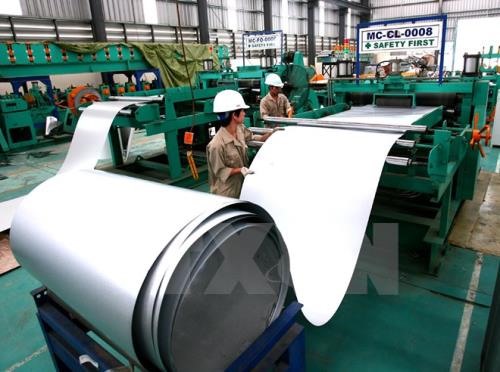Vietnam Steel Association (VSA) has asked the Ministry of Industry and Trade (MoIT) to take measures to support steelmakers in the investigation against tax evasion for galvanised sheet steel and cold-rolled coil of Viet Nam which was initiated by the United States.

The Vietnam Steel Association (VSA) wants the Government to take a strong stance against anti-dumping duties levied by the US on certain products, including raising a dispute with the WTO, if needed.
It has requested the Ministry of Industry and Trade (MoIT) to take measures to support steelmakers in tax evasion investigation initiated by the US for galvanised sheet steel and cold-rolled coils imported from Viet Nam.
In case the US does not change its view, the association has recommended that the ministry asks the Government to consider litigation under the auspices of the WTO.
The new proposals are a response to the US Department of Commerce (DOC) deciding to impose anti-dumping measures and anti-subsidy rates on corrosion-resistant (CORE) and cold-rolled steel from Viet Nam.
The case was initiated in September when US steel producers, including ArcelorMittal USA, Nucor Corp, AK Steel Holdings Corp and Steel Corp filed a formal complaint in which they claimed Chinese steel producers were shipping products via Viet Nam to evade tariffs.
In response, VSA said it expects the MoIT and its Department of Trade Defence to protest the DOC’s actions, which it said were inconsistent with international laws.
The ministry should ask the DOC to comply with WTO regulations as well as US law before issuing a formal decision on the tax evasion investigation, the association said.
The DOC has expressed its view that Chinese products wer being dumped in third-party countries like Viet Nam to circumvent import duties. Although the steel material was processed in Viet Nam, the department agreed with the claims of American producers that as much as 90 per cent of the product’s value originated from China.
VSA Chairman Ho Nghia Dung said Vietnamese steel businesses had poured hundreds of millions of dollars into modern technology lines to produce quality steel products, including galvanised sheet steel and cold-rolled coils that meet strict standards of the US and Japan markets. This has created significant added value in the production process, he said.
“The MoIT move will not only be one that protects Vietnamese steel businesses but also one that sends a message to the US that Viet Nam will continue to fight vigorously against violations of international commitments and protect the legal and legitimate interests of Vietnamese exporters through international institutions,” said VSA.
If the DOC decision is unchanged, Dung said the Viet Nam steel industry would suffer huge losses because the US will expand anti-dumping and anti-subsidy duties applied to China at the rate of 199.43 per cent and 39.05 per cent, respectively, for Vietnamese galvanised sheet steel, which are produced from cold and hot-rolled steel from China.
As a result, the Vietnamese steelmakers who have exported galvanised sheet steel, which were produced from hot- and cold-rolled steel of China from November 1, 2016, will have to pay taxes equivalent to 238.48 per cent of export value in order to keep their customers and market.
More importantly, VSA said the conclusions of this investigation would create a precedent as at present, Viet Nam’s hot-rolled steel is mainly imported from several countries and territories subject to US anti-dumping and anti-subsidy for cold rolled steel and galvanized steel sheet like Taiwan and South Korea.
Therefore, in case the US steel industry continues to impose this condition related to other countries and territories, Vietnamese steel mills will be under pressure to find other hot-rolled steel sources.
Moreover, Viet Nam may face the risk of completely losing the US market for these two products.
According to the VSA, the national steel industry has made good progress in recent years. In 2016, the country exported more than four million tonnes of various steel products worth over US$3 billion.
In particular, the export of cold rolled steel products and galvanized steel to the US recorded a whopping 530 per cent and 658 per cent growth, respectively, over 2015. The growth was partly due to the fact that the US previously imposed antidumping and anti-subsidy duties on these two products imported from China.
As a result, US businesses looked for new suppliers, including Vietnamese steelmakers.
According to the association, the DOC conclusion completely violates the provisions of WTO agreements as also US law. A number of Vietnamese firms, who are mandatory defendants in the investigation, revealed evidence that galvanized iron sheet from Viet Nam had a high conversion rate (about 30-50 per cent) compared to the China’s hot rolled steel. This ratio is in line with the provisions of the WTO Agreement on Rules of Origin and international conventions. — VNS





